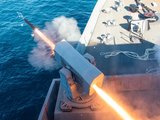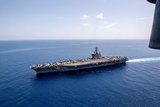Raytheon awarded RAM Block 2 contract
Raytheon has been awarded a contract by the US Navy for Rolling Airframe Missile (RAM) Block 2 guided missile round pack requirements, the company announced on 11 January.
The $66.6 million firm-fixed-price contract includes options, which, if exercised, might bring the total value to $142.8 million. It also includes options for foreign military sales to an international customer.
RAM is a cooperative programme between the German and the US governments. It is supported by RAMSYS in Germany and Raytheon. Under the contract, the production will be shared between both companies, and will be completed by February 2018.
RAM is a supersonic, quick reaction, fire-and-forget missile providing defence against anti-ship cruise missiles, helicopter and airborne threats, and hostile surface craft. The missile's autonomous dual-mode, passive radio frequency and infrared guidance design provide a high-firepower capability for engaging multiple threats simultaneously.
Rick Nelson, vice president, Raytheon's Naval Area and Mission Defense product line, said: ‘RAM Block 2 adds important enhancements to counter a bigger set of targets and give our warfighters an unfair advantage. Our partnership with RAMSYS is a great example of Raytheon's commitment to working with countries and companies around the globe.’
More from Naval Warfare
-
![European navies line up $105.8 billion in unawarded contracts for 2026]()
European navies line up $105.8 billion in unawarded contracts for 2026
France, Germany and Italy lead the way on unawarded naval defence opportunities that could be awarded this year, but across Europe countries are ramping up their spending efforts to face geopolitical challenges.
-
![Spain’s F100 upgrade mirrors Aegis modernisation paths in allied navies]()
Spain’s F100 upgrade mirrors Aegis modernisation paths in allied navies
The Spanish Navy’s Alvaro de Bazan-class of air defence frigates will receive the latest Aegis Weapon System technology among other modernisations to extend the service life to 2045.
-
![UK’s Fleet Solid Support ship programme deemed on track despite steel supply concerns]()
UK’s Fleet Solid Support ship programme deemed on track despite steel supply concerns
Shipbuilders are saying the programme is going ahead on time as the government estimates 7.7 million tonnes of steel are needed for 2026 infrastructure projects.
-
![Raytheon unveils details of its proposal for the US Navy/NATO ESSM Next Significant Variant]()
Raytheon unveils details of its proposal for the US Navy/NATO ESSM Next Significant Variant
In an exclusive interview with Shephard, Raytheon’s VP of Shipboard Missiles disclosed what improvements the company plans to offer for the Sea Sparrow NSV.






















